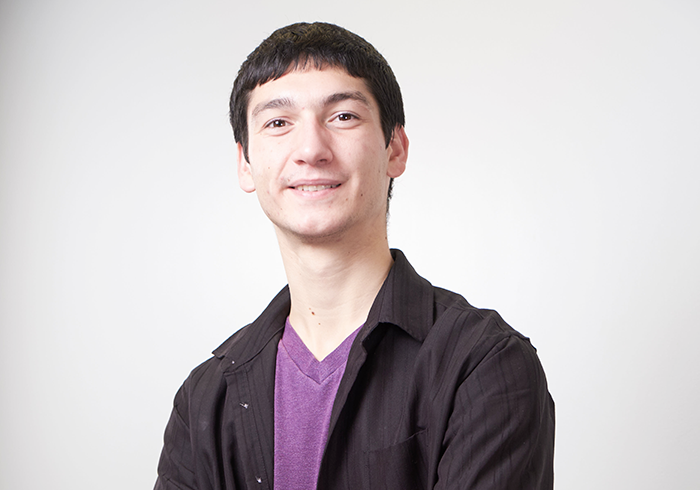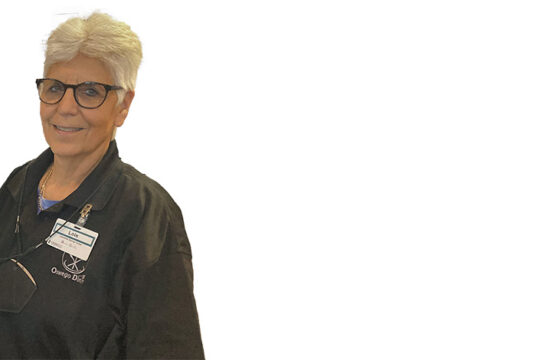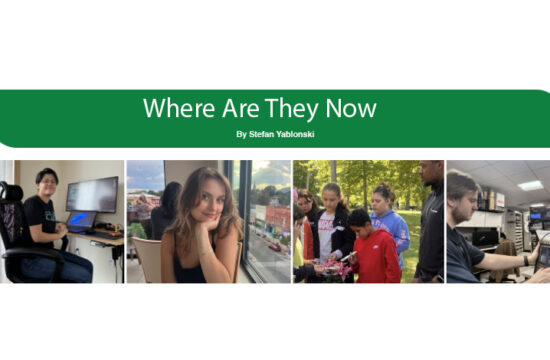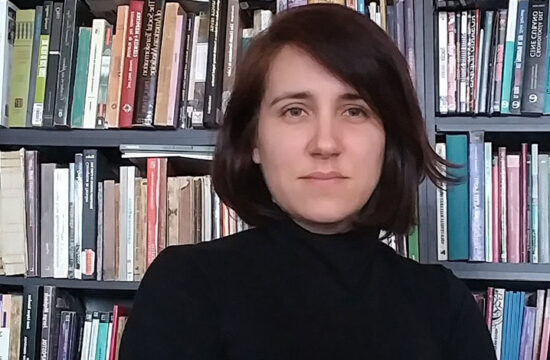Fresh off graduation, SUNY Oswego computer programmer plugs into big dollars
By Lou Sorendo
Alexander Kouthoofd may be leaving his heart in Oswego, but he is taking his gigabytes to San Francisco.
Based on his entry-level wage, the 2,799-mile trip will be well worth it.
Kouthoofd recently graduated from SUNY Oswego with a Bachelor of Arts degree in computer science. To say he has quickly parlayed that into something positive is an understatement.
The Oswego native has been hired by Salesforce in San Francisco, a cloud computing company, and will be making $125,000 a year right out of the gate.
To put that into perspective, the typical student at a mid-range four-year college earns $40,500 a year one decade after enrolling, according to the U.S. Department of Education.
To the casual observer, $125K is an impressive amount of cash. But Kouthoofd advised that wage level is “standard” at Salesforce.
Nonetheless, it “wicked took me off guard,” he said.
“It was more like going completely stiff because you don’t want to completely freak out on the person who just told you that,” he said. “It’s a very surprising number when it’s just thrown at you.”
“It feels pretty good” to command that kind of pay, Kouthoofd said.
“You always hear that computer science is high paying and a good occupation to get into, but I still wasn’t expecting that. It’s really comforting to know that all the hard work is paying off,” he said.
In his final semester, Kouthoofd was carrying an impressive overall 3.92 grade-point average, which qualifies him for high honors.
The recent grad’s first job was working for Alex Pantaleev, assistant professor of computer science and game design and development at SUNY Oswego.
Pantaleev and his wife Lynna Cekova own Prista Technologies in Syracuse, which does subcontracting work for the federal government.
Kouthoofd, 21, was hired on a part-time basis while still in college.
Prista Technologies specializes in programming for government radar systems, and Kouthoofd mostly tested equipment to make sure it operated properly.
Off and running
He was at Prista Technologies when he met a colleague there who had been hired by Salesforce, and he helped line up Kouthoofd for an interview for a paid internship.
“Once I got into the internship last summer, it all played out from there,” said Kouthoofd, noting he will start his new journey as a software engineer on Feb. 8.
Kouthoofd characterized the interim period leading up to his start date as “nerve wracking” but exciting.
“At Salesforce, I will be working on a program that improves the performance of the main application that the company has,” he said. “It’s all about making things faster. The main application can be pretty slow sometimes, so our job is to make it run faster.”
Kouthoofd said his internship was great.
“I love San Francisco and the city life is exciting. The weather is never cold; it’s not necessarily warm, but it’s always never cold, which is nice,” he said.
San Francisco has 43 hills ranging upward from 200 to 938 feet.
“It’s an interesting system because the city is surrounded by a road that’s nice and flat and you can go around the city and then make your way in and don’t have to go through all those hills,” he said.
“The company is great and has the coolest environment ever. They like to make lots of jokes and have a lot of fun,” he added.
Salesforce is regarded as the world’s No. 1 customer relationship management platform. It features cloud-based applications for sales, service and marketing.
Its revenues in 2017 are an estimated $8.39 billion. With about 10,000 employees worldwide, it is the largest tech employer in San Francisco.
“It’s largely focused on creating products for other businesses, which is why it’s not a company that most people have heard of,” he said.
It recently constructed Salesforce Tower, a 1,070-foot-high skyscraper that is the tallest and most expensive building in San Francisco.
“Salesforce has this really cool system called the ‘one-on-one model’ that has all employees at some point go and do some fun volunteer work,” he said. “It’s required but you can pick what volunteer work you want to do.”
Kouthoofd assisted a volunteer group during his internship when it helped at a soup kitchen and charity soccer game.
The recent grad said he hit many learning curves during the internship.
“You learn how to program from college, but you learn how to do your job on the job,” Kouthoofd said. “Pretty much anything you do at the college preps you to critically think. Things you learn in college are helpful, but they don’t directly apply to the job.”
Kouthoofd said he has previewed apartments, and has discovered that in San Francisco for a one-bedroom apartment or efficiency studio, the cost is around $3,000 a month.
Some of the apartments he was looking at located next to the commercial district were priced higher.
“Which is ‘ouch’,” he said.
However, once outside the city, rentals drop to around $2,000. “That’s about as low as it gets,” he said.
A co-worker of his resides in Pleasanton, a suburb in the San Francisco Bay area. There, he is paying $2,000 in rent.
Kouthoofd said he intended to either stay at a hostel or with his colleague in Pleasanton for a week or so in mid-January while attempting to find his own space.
Dispelling stereotype
Kouthoofd said the typical stereotype of a “computer geek” bears some truth.
“Geeks” have commonly been described as fairly quiet, digitally savvy yet socially awkward types.
“There are also some misconceptions to it. You have people who are great artists who do computer science,” he said. “I couldn’t draw to save my life, but there are plenty of other ways to express creativity.”
Kouthoofd enjoys the discipline of parkour, which uses movement that developed from military obstacle course training. Participants navigate from one point to another in a complex environment, without assistive equipment and in the fastest and most efficient way possible.
It includes running, climbing, swinging, vaulting and other movements deemed suitable for the situation. It’s not uncommon to see Kouthoofd doing back flips en route to his destination.
“It’s all about being creative and trying to figure out what is the best way to get from one place to another with maybe some flair added in,” he said.
While the nightlife may seem enticing to a person in his early 20s, Kouthoofd tends to abstain from such activity.
“I had three other people that I lived with during my internship, and two of them were definitely partiers,” he said. “They were out every night. They never caused us problems, but you could tell they really liked the night life.”
However, that may have been an anomaly.
“As you might imagine, computer science people don’t often go out,” he said.
“I think the reason we don’t is we’re too busy,” he said. “Computer science takes up a lot of time. When you are working on an assignment, it’s a huge time sink.”
Exploring his passion
Besides excelling in the classroom, Kouthoofd served as vice president and public relations officer for the college’s Computer Science Association.
“Computer programming has always been one of my favorite things to do since high school,” he said.
He said he loves the challenge.
“I just think it is super fun. It is hard, but every time you get something done, it is really satisfying because you can actually see it work and function,” he said.
He also was affiliated with Team Mini, a club at SUNY Oswego that focuses on learning and working with robotics.
“They have this really cool robot that runs on the ice during the intermissions of hockey games on campus,” he said. “We would actually [remotely] drive the robot out onto the ice, where it would shoot T-shirts out into the crowd.”
Kouthoofd also participated with the SUNY Oswego Outdoor Club, which delves into activities such as hiking and skiing.
One of his favorite outdoor activities is rock climbing, and he has frequented The Ledge at Pacific Health Club in Liverpool that features indoor climbing for training purposes.
“You wouldn’t believe the number of people in San Francisco who go rock climbing,” Kouthoofd said.
He said at 5 p.m. weekdays, the four rock climbing gyms in the city are packed.
“I think it’s a lot of computer science people who don’t get a lot of exercise from sitting in a chair all day,” said Kouthoofd, noting he encountered fellow interns from his company there.’












